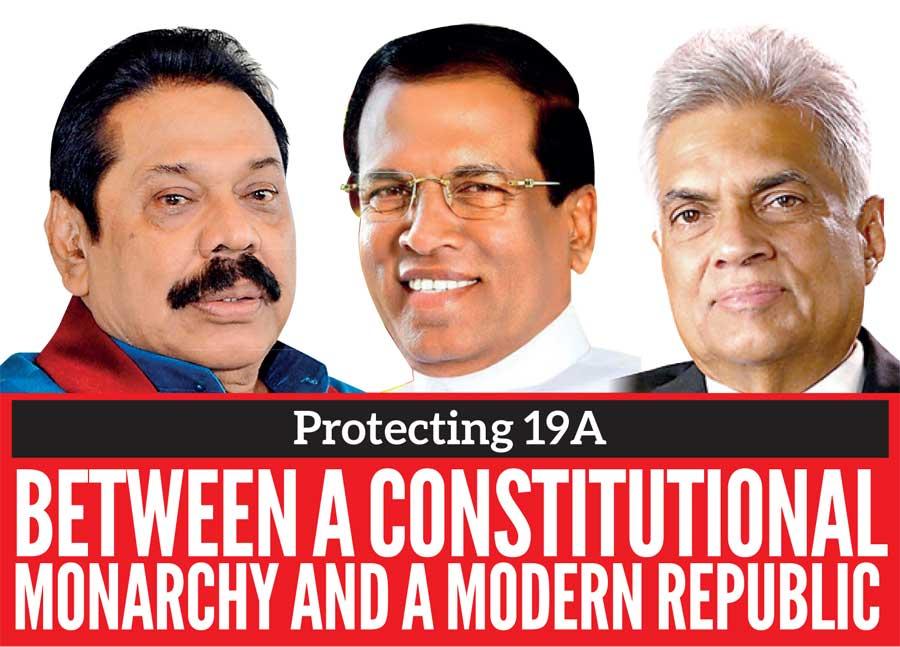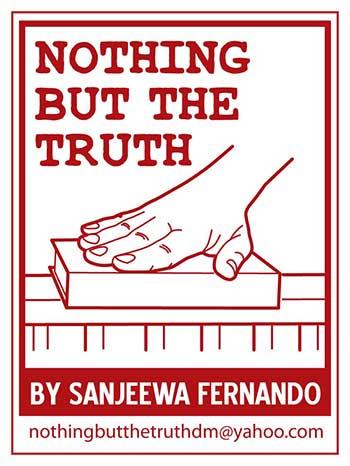Reply To:
Name - Reply Comment

The 19th Amendment is without doubt, the most democratic and progressive piece of amendment that the 1978 Constitution ever saw being made to it. Not only was the changes incorporated into the Draconian 2nd Republican Constitution by 19A, the keeping of a promise given by Maithripala Sirisena, the former President, when he contested against the then incumbent two- times president Mahinda Rajapaksa, it was also the realisation of a struggle that has been going on ever since the day the 1978 Constitution came to be the supreme law of this island nation. When the 19th Amendment was introduced to the Parliament in 2015, only one vote was cast against it. The Overwhelming majority of the peoples representatives including the subsequent detractors like Mahinda Rajapaksa raised their hands in favour of 19A.
Not the system but the personnel
Then why has this amendment now become a demon all of a sudden? Many blame the power structure that the mode of governance the amendment envisaged, by creating a power structure based on two depositories of power, in the Executive President, though hamstrung substantially by the checks and balances brought about by the amendment and on the other hand the Prime Minister, who had been made equally or, as some might suggest, more powerful by the changes introduced. They point to the stagnant economy, inefficient governance and the Easter bombings as direct results of this tug of war that ensued between the then President Sirisena and Premier Wickremasinghe.
The fact that all the said maladies have their roots in the ‘cold war’ that erupted between the then president and the premier of the Yahapalana government cannot be denied. Yet the argument that it is an inherent flaw in the system of governance engendered by 19A is without base. The tug of war was the result of the unwise, power greedy actions and attitudes of two personalities who had rallied together to defeat a greater evil, but who found out very soon that they were from two different planets in terms of not only their political dispositions but social , cultural , intellectual and even sexual orientations. It was unfortunate that a struggle against political tyranny , tribalism and downright roguery had to be jettisoned due to the idiosyncrasies of two individuals who led the two political streams that fought and won against an authoritarian ruler.
Workable for sure
What the so called Constitutional Coup of October 2018 displayed was not a constitutional flaw that was in the 19A  in terms of the powers of President vis a vis those of the PM; but a manifestation of putrid, corrupt and greedy politics that have been the bench mark of all political machinations in this country since independence. The French Constitution which has one of the most powerful Executive Presidential systems in the world, operates efficiently with the same type of provision which makes the tenure of the PM and the Cabinet not subject to the whims and fancies of the President but at the decision of the legislature. A decent, democratic and ethical political environment backed by good constitutional practices make the French Constitution work smoothly and efficiently , making it arguably the best scheme of governance in the whole of Europe. Why the same scheme fails in Sri Lanka is not the provision but the practice.
in terms of the powers of President vis a vis those of the PM; but a manifestation of putrid, corrupt and greedy politics that have been the bench mark of all political machinations in this country since independence. The French Constitution which has one of the most powerful Executive Presidential systems in the world, operates efficiently with the same type of provision which makes the tenure of the PM and the Cabinet not subject to the whims and fancies of the President but at the decision of the legislature. A decent, democratic and ethical political environment backed by good constitutional practices make the French Constitution work smoothly and efficiently , making it arguably the best scheme of governance in the whole of Europe. Why the same scheme fails in Sri Lanka is not the provision but the practice.
Another achievement of the 19A was the creation of the Constitutional Council which took away the exclusive and most of the time, arbitrary powers of the President of appointing individuals to high positions in the State apparatus by empowering independent commissions. Yet even this set up has been criticized as leading to crisis when the Constitutional Council does not approve of a nominee of the President and in retaliation the President refrains from making fresh nominations. Yet the same scenario prevails in the United States where certain appointments of the President has to be approved by the Senate which is most of the time, under the control of the party opposed to the President’s. Yet political decision making based on compromise and consensus ensures that those high offices are duly and promptly filled and consequently the United states remains one of the most stable and prosperous political systems in the world.
One man show
In the Sri Lankan context where the Executive Presidency pre-19A had a free hand in appointing persons to high office and thus undermining the impartial independent and proper performance of their duties as the case of the former Chief Justice Shiranee Bandaranayaka clearly shows, it is of paramount importance that such appointments are not at the whims and fancies of one individual. Specially in the present context where the Rajapaksa’s clan and their cohorts are appointed to all positions perceivable under sun, the system needs a body of the nature of the Constitutional Council to ensure that nepotism and political subservience are not the yardstick by which people are evaluated when it comes to appointment, removal and more importantly, performance
in high office.
It is ironical that the political alliance led by Prime Minister Mahinda Rajapaksa harps on the issue of political stability in a context where we are not at war by any stretch of the imagination, as it was Mahinda Rajapaksa who led many protests, walks, movements and struggles against the Executive Presidency in the Eighties and the Nineties when the entire country was engulfed not only with Tamil separatist civil war but armed insurgency in the south. We have overcome such dire situations and admittedly the Executive Presidency has helped. But the present environment does not warrant a relapse to a security and surveillance state by any stretch of the imagination with no immediate threat from within or outside and most certainly not to the extent of removing hard fought constitutional reforms of curtailing the arbitrary powers of the President.
Pro-Democracy struggle
Now with the SLPP commanding a 2/3rds majority in Parliament and the President, too coming from the same political party there seems to be little hope of resisting in Parliament any constitutional move that might be introduced to remove the checks and balances imposed by the 19A. Yet the main opposition the SJB has expressed their steadfast support to defend the 19 A and hopefully there will be minority and smaller parties in the Parliament who supported the amendment in 2015 and who still want the progressive measures it introduced. It is to be hoped that the civil society organisations which fought for the 19A would remain faithful to the salutary provisions they managed to get incorporated in to the supreme law book of the Country.
Neither Ranil Wicremesinghe nor Maithripala Sirisena might have the political clout anymore to raise any resistance against the government’s move to scrap the 19A. But the progressive, forward looking and pro-democracy forces which they led at the 2015 January revolution need to take the baton the two leaders have shamelessly dropped and join the fight for the protection of all the salutary provisions the 19th
amendment introduced.
It is not a question of a constitutional power structure that is at stake now; it is one of whether we wish to remain a democracy, a civilized nation and a modern Republic any more!!